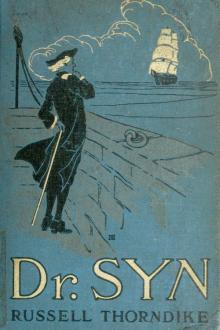Doctor Syn - Russell Thorndyke (new reading txt) 📗

- Author: Russell Thorndyke
- Performer: -
Book online «Doctor Syn - Russell Thorndyke (new reading txt) 📗». Author Russell Thorndyke
“That’s the Scarecrow,” whispered Beelzebub. “That’s the great man hisself.”
One of the jack-o’-lanterns trotted off on his pony toward this figure, and Jerk saw him salute the Scarecrow, who handed him a paper. Saluting again, the youngster came back to Beelzebub, who took the paper from him and read it carefully by the light of the young jack’s lantern. These boys carried lanterns fixed upon long poles, bearing them standard fashion as they rode.
As he was reading, Beelzebub kept catching in his breath in an excited manner, and as he tucked the paper away in his belt he muttered: “May the Marsh be good to the Scarecrow tonight!” Jerry instinctively looked down the road to where the Scarecrow had been standing, but horse and rider had disappeared. “Ah! Jack Ketch,” said Beelzebub, “you are wondering wot’s become of him, eh? You’d need an eye of quicksilver to keep sight of him. Here, there, and everywhere, and all at once he is, and astride the finest horse on Romney Marsh, a horse wot ‘ud make the Prince Regent’s mouth water, a horse more valuable to the Scarecrow than the Bank of England ‘ud be.”
“But where’s he gone to?” asked Jerry.
“About his business and thine. Jack Ketch,” answered Beelzebub.
“I wish I’d seen him go,” returned Jerry, “for I likes to see a good horse on the move. He went very silent, didn’t he?”
“You’ll never hear the noise of the Scarecrow’s horse a-trottin’, Jack Ketch, ‘cos he’s got pads on his hoofs. Ah! he’s up to some tricks, is the Scarecrow, and, by hell! he’ll need ‘em tonight.”
“Why?” asked Jerk.
“Because he’s had word passed from Hellspite that the King’s men are out, and Scarecrow thinks as how we may have to fight ‘em.”
“And don’t you want to do that?”
“Why, you see it ‘ud be awkward if any of us got wounded, as wounded men ain’t easy things to hide in a village now, is they? and it ‘ud be a difficult business to explain. Though, come to that. Scarecrow ain’t never put out for an explanation o’ nothing.”
As he was speaking, Beelzebub took Jerry’s rein and started off again at the head of the cavalcade. Their way was now along the road the Scarecrow had gone, and when they had ridden for about half a mile they again sighted him, sitting his horse stockstill in the middle of the road, but this time he was not alone, for there were some half-dozen men leading packponies from the road into a large field. Toward this field Beelzebub led his cavalcade, and consequently they had to pass the grim figure called the Scarecrow. Jerry was ambitious to get a near view of this strange personage, for he wanted if possible to pierce his disguise and see if he could recognize the features. But the nearer he got, the stranger the strange figure became. If it was any one that he knew, then it was only the scarecrow in Mipps’s turnip field, for he was as like that as two peas are alike to each other.
And the voice was not like any voice he could put an owner to, although there was something familiar in it. It was a hard, metallic voice, the voice of a commander.
“The King’s men are watching the Mill House Farm, so, Beelzebub, you will circle the packponies as usual till we get half a mile from the house, then you will cut off and decoy them from the rear. If your attack is sudden and fierce they will have all they can do to defend themselves, and so that will afford the Mill House Farm men time to get their packponies in with the others. I will see that they get them away safely, and when you have shaken off the King’s men pick us up again on the Romney road opposite Littlestone Beech. Understood?”
“Understood, Scarecrow, understood,” replied Beelzebub promptly.
“And,” went on the strange man, “you will stick by Jack Ketch as far as possible, and don’t let him get into any needless danger. I want him to see all the fun that is possible, but I don’t want any hurt to come to him. If I alter the plans, I’ll pass the word. Understood?”
“Understood, Scarecrow, understood,” repeated Beelzebub.
“Then off you go!”
And off they did go, the packponies, trotting under their heavy loads of wool, keeping along the edges of the field, and this with a very good purpose, for where the dykes run zigzag over Romney Marsh a thick mist arises some eight feet high, and even upon nights of full moon these mists hang about the dykes like heavy rolls of a spider’s web, contrasting strangely with the rest of the country, which is all bright and easily seen. And now Jerk had to ride even faster than before, for the packponies, entirely hidden by the mist curtains, were circled and circled all the way by the galloping demons and jack-o’-lanterns, these last swinging their pole lights round their heads and uttering strange cries like those of the Marsh fowl, weird and ominous. This accounted, then, for all the ghost tales he had heard, for all the ghostly things those not in the secret had seen upon the Marsh, and a very clever scheme Jack thought it was, and a very good way of clearing the ground of the curious. For there is no power like superstition, and nothing that spreads quicker or is more grossly exaggerated than tales of horror and fear. So on they rode in wild circles round and round the packponies. Beelzebub was the actual leader. He it was who gave the orders, but the mysterious Scarecrow would dash out of the mist every now and again just to see that all was well with the legion, and then as quickly would he disappear, borne away like a ghost upon that spectral gray thoroughbred.
Jerry of course knew the terror with which the pallid host could affect the unwary wayfarer—for had he not seen them himself on the night of Sennacherib’s murder?^ — but had he needed other proof he would have got it in the case of a small encampment of gypsies. They were not a recognized band of gypsies, but a wandering family, tramping from town to town, from village to village, getting what they could here and what they shouldn’t there, to keep the poor life in their bodies. The gallopers came upon them in a ditch. They had lanterns there and a small fire around which three men and a young lad were sleeping. There was an old crone rocking herself to sleep on one side of the fire, and opposite, between two of the sleeping men, was a younger woman. Her garments were tattered and ragged to the last degree, and her shoulders and arms showed bare, for she had wrapped her shawl round the babe that was crying in her arms. The sudden appearance of the awful riders spread instant panic in this little circle. The old crone shrieked to her menfolk to awake, but before they could get to their feet the horses were upon them. Beelzebub, with daredevil precision, rode straight through the wood fire, his horse bellowing with fright as he scattered the crackling sticks. The young mother just avoided Jerry’s horse as he came crashing through after Beelzebub, and the shriek of fear that she gave made Jerry turn heartsick as he reined in his mount.
“An ill-famed baggage, I’ll be sworn,” said Beelzebub . “‘Twould have been a good thing had you ridden her down, and as for the brat, such devil spawn should be put out of their misery.”
“Now I should have thought devil spawn would have had rather a way with us.” At which sally Beelzebub clapped Jerk on the back, and declared that he was a good Ketch, a remarkable good Ketch, and as the young recruit had all he could do saving his own neck every minute as they leaped backward and forward over the dyke, this unpleasant episode was forgotten, or, rather, slid back into his brain like the memory of a nightmare slides when we dream again. On they dashed, but stopping at numerous farms on the way, where they always found more packponies waiting to join the cavalcade. And the Scarecrow was always somewhere. As soon as any little hitch occurred—as one frequently did when the men placed the temporary bridge over the dykes for the transit of the packponies—the Scarecrow would suddenly appear in their midst, giving sharp orders, whose prompt obedience meant an instant end to the difficulty, wdiatever it chanced to be. But it was the laying of this same temporary bridge that caused most of the delays, for it was a cumbersome thing to move about, and it had to be built strong enough to support the weight of the packponies. These ponies, too, caused considerable bother at some periods of the march, as their packs of wool would sometimes shake loose from the harness, and the cavalcade would have to stop while this was being remedied. But although the packponies stopped often, the demon riders were never allowed that luxury. Beelzebub untiringly flagged the horse round and round, now in large circuits, now in small circles, always ringing in the packponies from any prying eyes. It would have meant death to any one who got a view within that sweeping scythe of cavalry. And as murders on the Marsh were all put down to Marsh devils, except in the case of Sennacherib Pepper—for there was then a likely assassin known to be at large upon the Marsh to lay the deed to — and because of the dreaded superstition that had grown in the minds of Kentish folk, the smugglers were utterly callous as to what crimes they perpetrated, for they were as safe from the law as the most law-abiding citizen, for those who didn’t credit the existence of murdering hobgoblins at least possessed sufficient fear of the smugglers themselves to leave them alone; for, after all, it was no business of any one but the revenue men, and so to the revenue men were they left, and in nearly every record it may be seen that the revenue men got the worst of it.
MILL HOUSE FARM was the last on Beelzebub’s list, and in the dyke facing the house, but on the other side of the highroad crouched the King’s men, commanded by the captain’s bo’sun. They were as still as mice, for the captain had given strict orders to the bo’sun on that score, but they need not have put themselves to such pains, for owing to the extreme vigilance of Sexton Mipps the smugglers knew exactly where they were and what they were going to do.
Now it is depressing to the most seasoned fighters to have to crouch for hours in a soaking muddy dyke waitting for an outnumbering enemy; for it was common knowledge that if smuggling was carried on upon the Marsh, it was well manipulated and relied for its secrecy upon the strength and numbers of its assistants. So the bo’sun had no easy task in keeping his men from grumbling; for whatever Captain Collyer’s opinion may have been with regard to maintaining the law according to his duty, it was pretty evident that his men had no great relish for the task, and the bo’sun heartily wished that the captain had not left him responsible, for his absence was having a poor effect upon the men, and the unfortunate bo’sun was greatly afraid that they would fail to put up a good fight when the





Comments (0)